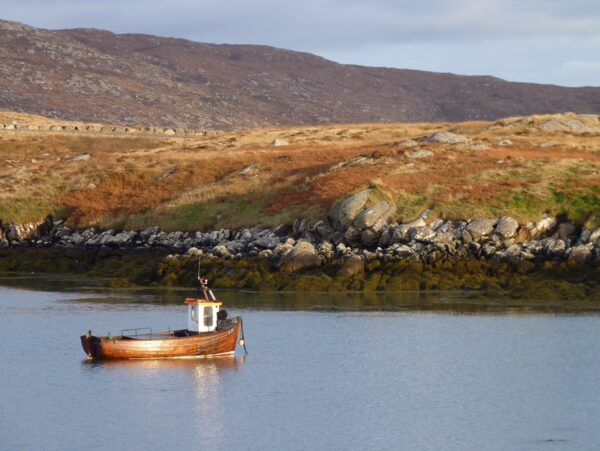A report titled ‘Fisheries policies adaptation and resilience to climate change and ocean acidification’ was published from the ClimateXChange Secretariat earlier this May.
The research authored by BMT through ClimateXChange aimed at informing Scotland’s fisheries policies, specifically focusing on driving adaptation and resilience to climate change and ocean acidification. The research prioritised the development of appropriate climate change monitoring, research, and evaluation objectives which should be included in fisheries management decisions going forward. It also considered what amendments to policies might be required in order to include climate variables into fisheries metrics, and tools to aid adaptation within these policies to support commercial fisheries respond to the risks and opportunities outlined in the Scottish Climate Change Adaptation Programme (SCCAP).
Photo by A Weetman, Marine Scotland, © Crown copyright
Asimina Voskaki, Principal Consultant, and ‘Climate Risk and Resilience’ campaign lead at BMT, said: “Climate change has led to widespread adverse impacts on oceans and seas, including record-breaking temperatures, oxygen loss, and greater ocean acidity. By understanding how these changes are manifesting themselves in the Scottish marine environment, we can identify ways to mitigate the risks, take advantage of opportunities and sustainably manage commercial fisheries.”
“The research findings and recommendations resulting from this project will serve as a cornerstone for the development of forward-thinking policies. In our ‘customer friend’ role to ClimateXChange we are committed to ensuring that our research guides the Scottish Government’s decision-making processes and practices in sustainable fisheries.
The project first conducted a literature review on broad body of peer-reviewed journal articles, government studies, non-governmental organisation reports, and other technical reports, then the team held an expert engagement online workshop to discuss the predicted effects of climate change on fish stocks and the likely effects on the Scottish fishing industry. The output was then to provide recommendations to fill information deficits and inform policy.
Key Findings
The Scottish marine ecosystem and fisheries face a dynamic future due to climate change:
- Ecosystem Impacts: Climate change and ocean acidification will cause ecological changes to key commercial species in Scottish waters, affecting their distribution.
- Shifting Fishing Grounds: As commercial species shift geographically and weather becomes unpredictable, the importance of traditional fishing grounds will fluctuate.
- Sustainable Yield Assessments: Climate change may undermine the reliability of Maximum Sustainable Yield (MSY) assessments, which are used to determine sustainable catch limits.
- Management Tools: Marine Protected Areas (MPAs) may become ineffective as species distributions and abundances change.
- Ecosystem Resilience: Reducing disruptive fishing methods can increase the resilience of inshore ecosystems to climate impacts.
- Industry Opportunities: Redistribution of commercial species could present new opportunities, but the industry needs consumer and supermarket support to diversify.
- Improving Models: Enhancing current models by incorporating ecosystem changes and interactions between temperature and acidification can provide better forecasts.
Recommendations
To manage Scottish fisheries effectively, policies should focus on adaptability and flexibility through the suggested following steps:
- Baseline Monitoring: Increase research and data monitoring to understand climate impacts and the adaptive capacity of Scottish fisheries.
- Risk Assessment: Conduct local risk assessments to identify significant threats and prioritize adaptive strategies at ecological and socio-economic levels.
- Trigger Points: Use modelling and risk assessment outputs to establish trigger points for fast action to address food security issues.
- Stock Assessment and MSY: Integrate climate variables into MSY calculations and stock assessments to enhance resilience and provide accurate quotas.
- Collaboration: Coordinate fisheries policies with other relevant policies and foster international partnerships to manage shared seas and stocks. Engage supermarkets and retailers in educating consumers about new target species as the industry adapts.
